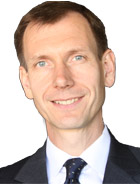Last week I attended the 2012 Sacramento Business Review, which was keynoted by Axel Merk, the President & CIO of Merk Investments. (Big thanks to my friend and budding Contrary Investing contributor legend, Jonathan Lederer of Lederer Private Wealth Management, for the great recruiting job!)
Here are my notes from Axel Merk’s keynote speech:
“In a Nutshell, We Have a Mess in the World”
Merk started by addressing the widely known problems the world is facing today – US indebtedness, Europe’s sovereign debt disaster, the possibility of QE3, and so on.
He’s especially concerned with the diverging policies being demonstrated by policy makers across the globe. They are acting in their perceived self-interest, says Merk – whether it’s monetary policies like the US, fiscal policies like the austerity measures beginning to sweep across Europe, or the currency wars that seem to have engulfed the entire planet.
The bottom line, he says, is that everyone is fighting change. For the last 25 years, the US has moved to a credit based economy. Meanwhile, Asia focused on jobs, and exports. It’s all coming to a head now.
American Mood Turns Populist
Today, Corporate America has no pricing power. US consumers are highly indebted. Higher commodity prices have squeezed margins.
To protect margins, corporations have outsourced jobs to save money. While this tactic has worked wonders from a P&L standpoint, Merk points out the inherent social implications. The middle class gets squeezed, leading to widespread social unrest.
Therefore, our politicians have turned populist. Anyone who saw Obama’s State of the Union speech will no doubt concur with this observation!
The Fed’s (Ineffective) Monetary Policy
Merk described the Federal Reserve’s QE1 and QE2 efforts as “ineffective.” The political situation in the US is a mess, in his view – with gridlock in Congress coupled with tax and regulatory uncertainties.
He cites a dovish Fed (only 1 hawk is voting this year) and an extreme fear of European contagion as bullish indicators for the likelihood of QE3. In fact, he believes Operation Twist may have laid the foundation for such action (as he recently told Yahoo Tech Ticker):
Does this guarantee inflation? Not in and of itself – Merk believes inflation will happen if people believe inflation will happen. It requires a positive feedback loop, in other words.
(Ed. note – Contrarian pioneer and hero Humphrey B. Neill wrote that inflation in the 1930’s was a non-event because it did not “take” with the public, despite the dollar being trashed by FDR & Co).
The US – Eurozone – Asia Self-Interest Carousel
When it comes to Europe, Merk says the order of the day is to “hope for the best, plan for the worst.” He sees this as not merely a European crisis, but really the next phase of the global financial crisis. (He put up a chart illustrating the cumulative change in central bank balance sheets over the past few years – it’s scarily breathtaking – I’m searching for it, will post if I find it).
According to Merk, countries act in their own perceived self-interest, and their currencies respond. Here’s my bootlegged photo of his slide, illustrating why the Fed appears to be engineering a weak dollar, the euro is shrouded by uncertainty, and the RMB may head higher (sorry about the heads in the lower-right!)
 Currency risks, as bootlegged from Sacramento. (Source: Merk Investments – Please click to enlarge)
Currency risks, as bootlegged from Sacramento. (Source: Merk Investments – Please click to enlarge)
China’s Real Estate Risks
While we’re discussing the RMB and Asia, Merk sees potential trouble brewing in Chinese real estate:
High-net-worth individuals own, on average, an astounding 3.3 housing units per person (2011 Allianz survey). Many of these “investment properties” have recently been developed and are not occupied. Rents are so low compared to the value of homes that it isn’t even worth looking for tenants. In 2010, about 5.1% of total national employment was in the construction industry, up from 3.8% in 2006. In Spain, known for its colossal housing bust, employment in the construction industry peaked around 2007, at 13.5% of the total workforce (about half those jobs have since been lost). In the U.S., residential construction supported 4.2% of the total workforce in the mid 1990’s and grew to over 5% in 2005, before dropping to around 3% in 2008. While China does not appear to have Spanish excesses, these metrics suggest China may still be vulnerable, given the recent U.S. experience.
Further reading – Axel Merk: Chinese Dragon to Unshackle the Renminbi?
Outlook for Financial Markets and Currencies
Merk pointed out several times during his talk that “there’s no such thing as a safe asset any longer.” Asset classes, he says, are increasingly correlated – caused largely by increased intervention in the markets by policy makers.
When asks why Bernanke can’t just raise rates (as he bragged to 60 Minutes), Merk said that Bernanke can’t raise rates like Volcker did because there’s too much leverage in the system today.
Finally, Merk recommended currency diversification – US investors are far too overexposed to the US dollar, he believes. But he warned against jumping blindly into emerging market currencies, as you are “buying” political risk, citing Vietnam and Brazil as examples of emerging markets debasing their currencies. Australia and Singapore, on the other hand, have demonstrated more prudent management of their currencies.
Axel Merk is the President and Chief Investment Officer of Merk Investments, manager of the Merk Funds. Founder of the firm bearing his name, Merk is an expert on macro trends, hard money, international investing and on building sustainable wealth. An authority on currencies, he is a pioneer in the use of strategic currency investing to seek diversification.

Recent Comments